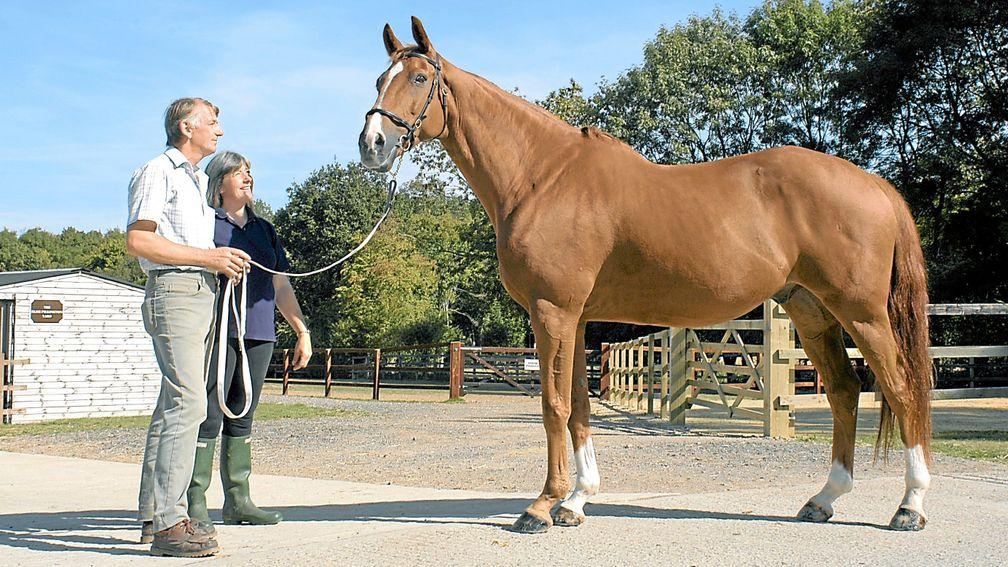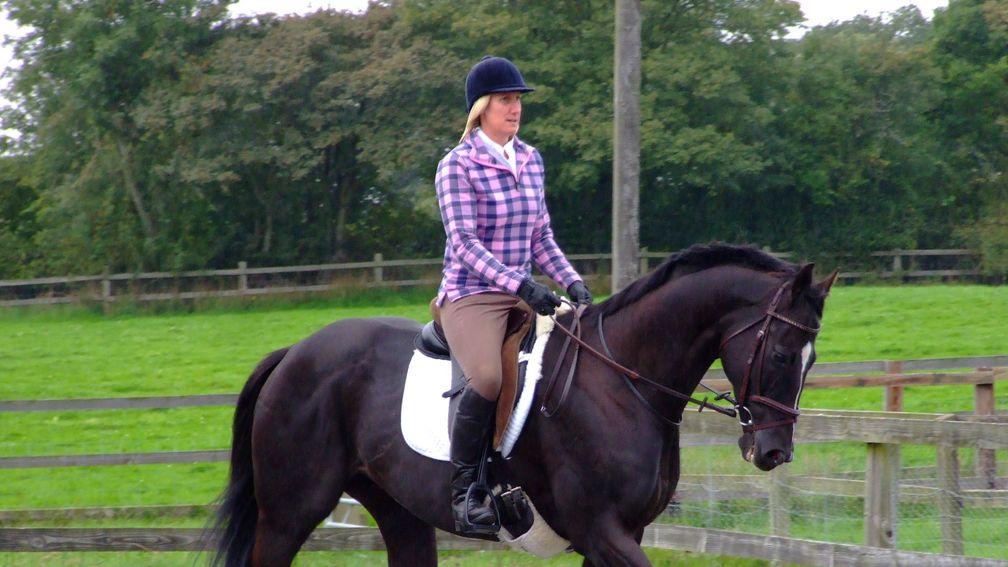Giving sanctuary to the old warriors who fall between the cracks
How racing's unreconstructable old heroes find their new niche in life

For every equine athlete who leaves the racing arena to make their mark in other equestrian disciplines, there are many, many more who find their niche lower down the pecking order as hacks and recreational horses. Out of sight and often out of mind, however, are those who are no longer fit or suitable to be ridden and must therefore rely on long-term charity or a line of work beyond the obvious.
One man doing more than his share for them is Graham Oldfield, who together with his partner Sue Collins runs the Racehorse Sanctuary and Rehoming Centre in Bruton, Somerset, where a steady stream of temporary, rehomable horses rub shoulders with a small band of residents who will never leave.
One such horse is Olympic Express, better known to British racing fans as the James Fanshawe-trained, Cheveley Park Stud-owned 2001 Britannia Stakes runner-up Ecclesiastical – who was sold to Hong Kong, where he won four Group 1 races and just shy of £2 million for his new owner before his story took a turn for the worse.

"We put Olympic Express into work, he was going beautifully and then he got a back problem, which takes a lot of work and money to treat. He's 20 years old now with limited sight, so we can't go and rehome him, it wouldn't be fair, and we're certainly not going to have him put down, because without a weight on his back he's a fit, healthy, happy horse. What he needs is sanctuary and that's what we provide."
Providing sanctuary is not the be-all and end-all for Oldfield and his team of volunteers. Rehabilitation and rehoming are the first aims, but occasionally the difficulties are too great, as Helen Yeadon, founder of the Greatwood sanctuary for former racehorses, near Marlborough in Wiltshire, admits.
"If a horse is unsuitable, can't be ridden, is mentally unsound, I'm afraid I put it to sleep," she says, "because we all have a duty to make sure a horse is cared for until the end of its life, which involves ensuring its exit is decent too. It would be a fool who thought you could save, retrain, rehabilitate or use every former racehorse, but our success rate is very good."
Success at Greatwood comes through treating former athletes – those unsuitable for rehoming because of injury, temperament or age – not as 'field ornaments' but as working components of the Horse Power scheme, a curriculum-linked programme which aims to help children with special learning needs through contact with horses.

"If a child isn't flourishing in a normal classroom environment, they come to Greatwood, where 50 per cent of the horses are used for educational programmes," explains Yeadon. "This rebuilds trust, gives the children improved confidence and greater social and communication skills, and offers more opportunities for more horses who cannot be rehomed or ridden but have a job to do.
"They're instinctive animals, they're intelligent. I'll see a horse who would be extremely naughty if I was holding him, and he'll stand as quiet as a mouse for a young person who may have special educational needs."
A one-time racehorse can't walk straight into its new line of work, but they can be reintegrated, and with their help the children likewise.
"When the horses come here they have to be let down and learn to be horses again, in a herd of 20 or 30, and somehow after that they tune in to a person's needs," says Yeadon.
"We have Potentate, the three-time Welsh Champion Hurdle winner, who is 27 now, and Seek The Faith, a very good two-mile chaser [whose owner could no longer afford to keep him], who is coming up for 30 – both great warriors who work hard on the educational programme and really like it.
"We have Deano's Beeno as well, but he's still as egotistical and difficult as he was on the racecourse and will still only do what he wants to in life, so he doesn't do a lot!"
The BHA's Retraining of Racehorses arm sponsors 20 horses who are used for the children’s programme and Greatwood also receives money for animal welfare, but Yeadon explains it has had to "change with the market, because if we'd just done what we originally did we'd have crashed and burned by now. The great thing about what we do now is that it's horses helping people and people helping horses, giving them a job and a reason for being".
Oldfield, likewise, is full of praise for RoR's efforts in promoting the retired racehorse, but feels more could be done for those for whom competition or gainful employment are impractical.
"Anyone and everyone to do with racing is levied for horse welfare and all that money goes to RoR, who do a wonderful job," says Oldfield, "but if a horse can’t be used for a purpose, then the BHA don't get involved.
"With money from the Peter O'Sullevan Charitable Trust we've been able to open a new high-dependency unit to provide that extra level of long-term care for horses like Olympic Express, but it's an ongoing struggle for us to stay open."
Even for Oldfield, there are some new arrivals who are too hard to handle, but on a shoestring budget he does his utmost to ensure a good quality of life for any horse that comes his way.
"Since I've been doing this I've had three horses put down simply because they're far too dangerous even for our staff to handle," he says, "and they're not happy horses, they're suffering, so you have to say that's enough.
"It's more psychological problems than anything, finding out what works and what doesn't, but it costs a lot, because sanctuary horses are treated as any other horse. We believe they're elderly equines who have earned that life, and if we have to go out and raise more money to pay for it, so be it."
Luckily, there is a future beyond the sanctuary for many of these out-of-commission horses, thanks to the compassion of the British public.
"We've rehomed an awful lot of horses as companions," says Oldfield. "A lot of people have competition horses at home who need company, and it's surprising how many people say, 'I don't need a horse, but I'd like to offer one a home because I like looking after them'. Hopefully you rehome one and the word spreads. Social media has its bad points but right now we couldn't survive without it.
"It's not easy, but we feel it's right to give every horse a chance. The superstars will always be looked after, but the others have given us their all, regardless of how good it was, and we need to give them something back."
The Racehorse Sanctuary, The Stables, Brewham Lodge Farm, North Brewham, Bruton, Somerset BA10 0JS. Contact Graham Oldfield: 07710 904189 or
Greatwood, Rainscombe Hill Farm, Clench Common, Marlborough, Wiltshire SN8 4DT. Contact Helen Yeadon: 01672 514535
The Retraining of Racehorses mission statement
From RoR's perspective, the first objective for a horse leaving racing should always be to try to identify a fulfilling second career option, be it dressage, showing, polo, horseball or simply being quietly hacked around the countryside. For animals of racing age who are used to being exercised every day, to then spend the rest of their lives in a field is rarely in their best interests.
RoR feels that the sport's funding of the charity is best deployed in identifying and encouraging active second career options. We will always provide for former racehorses who are vulnerable and in need of care and assistance at the RoR accredited centres or through the charities' Emergency Relief Fund.
In the small number of cases when a horse is either mentally or physically unsuitable for an active second career, and thus at long-term risk of having their own welfare compromised through neglect, unless they are lucky enough to be in the care of a sanctuary or a centre with trained help, then it is possible that euthanasia is actually the most humane choice available.
Di Arbuthnot, chief executive
Members can read the latest exclusive interviews, news analysis and comment available from 6pm daily on racingpost.com
Published on inBritain
Last updated
- Confirmed runners and riders for the December Gold Cup at Cheltenham on Saturday
- Racing to go ahead at Bangor on Friday after track passes inspection
- Four eyecatching runners on Cheltenham's Friday card - including a festival fancy and a cross-country contender
- Sir Alex Ferguson and friends looking to win it with kids again as Il Ridoto bids for big double at Cheltenham
- Is this Britain's next big Gold Cup hope? Kim Bailey ready to shoot for the stars with Chianti Classico
- Confirmed runners and riders for the December Gold Cup at Cheltenham on Saturday
- Racing to go ahead at Bangor on Friday after track passes inspection
- Four eyecatching runners on Cheltenham's Friday card - including a festival fancy and a cross-country contender
- Sir Alex Ferguson and friends looking to win it with kids again as Il Ridoto bids for big double at Cheltenham
- Is this Britain's next big Gold Cup hope? Kim Bailey ready to shoot for the stars with Chianti Classico